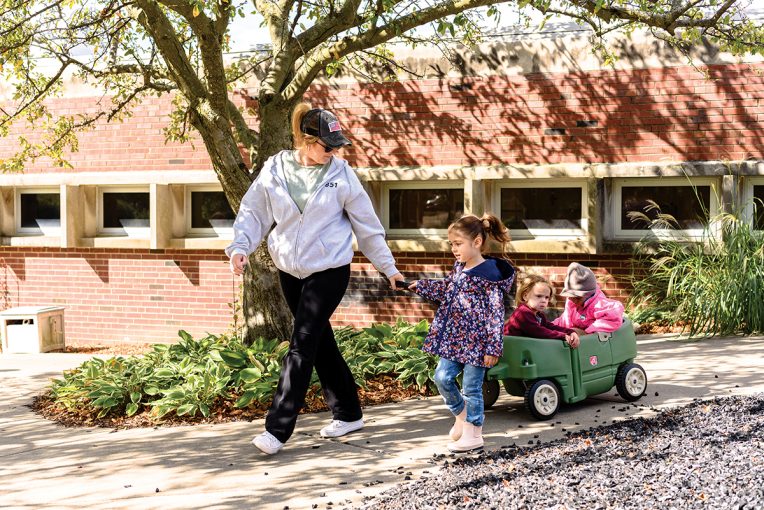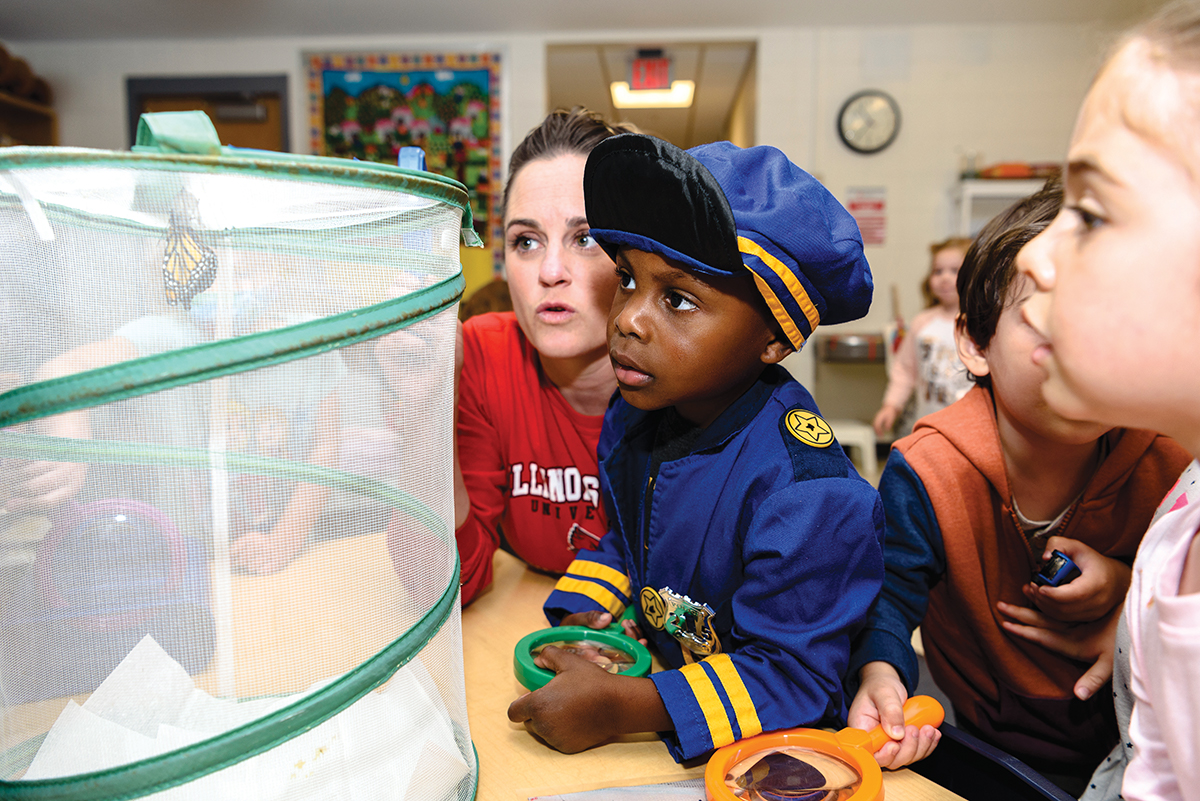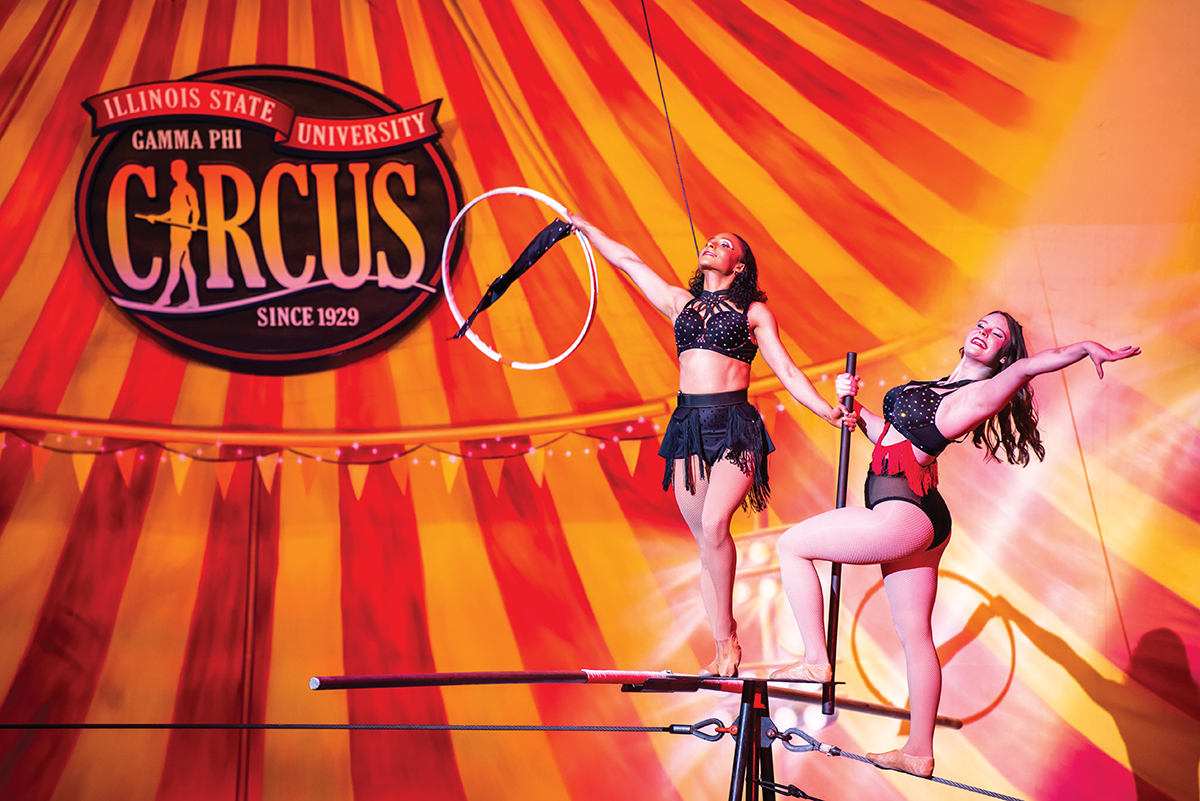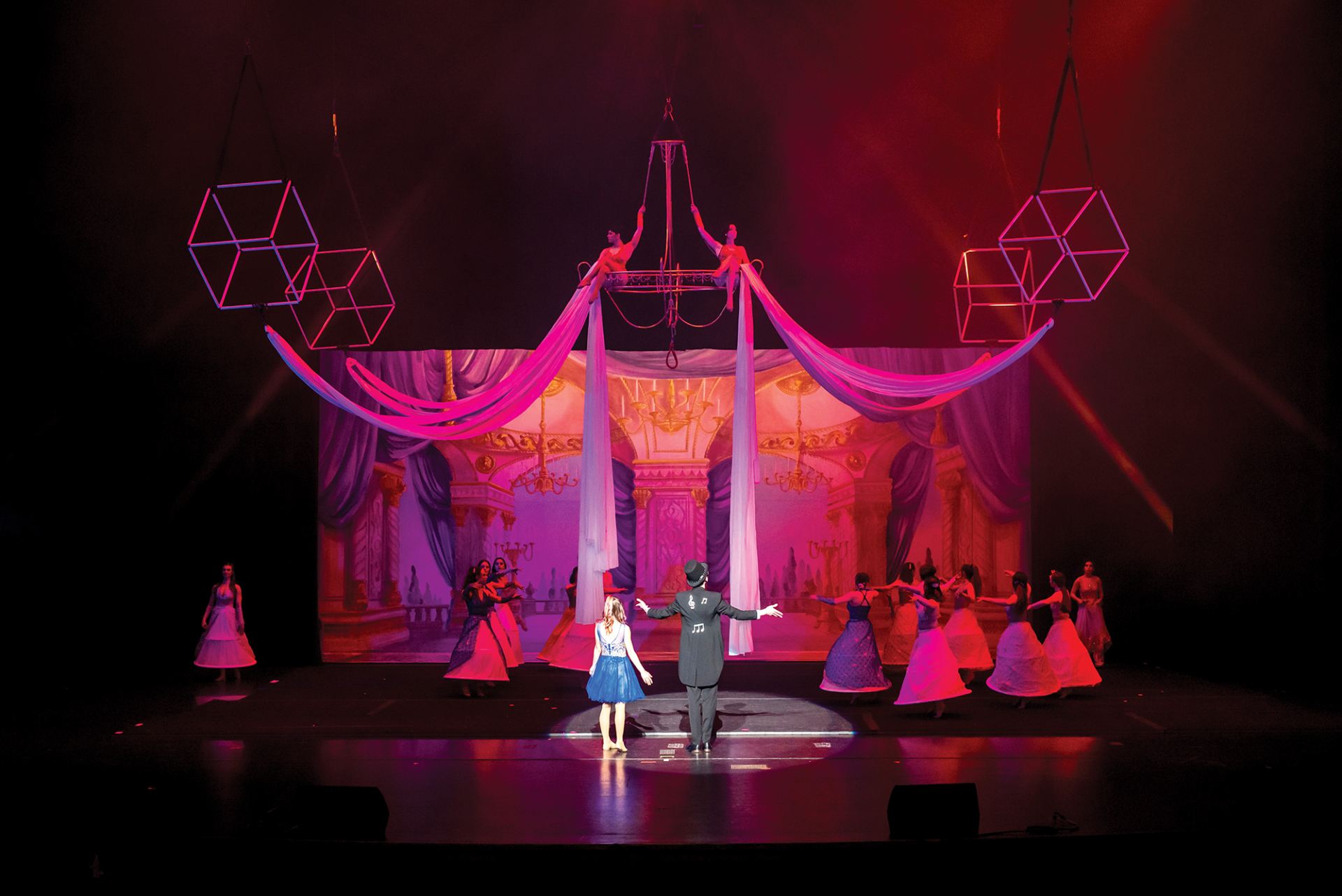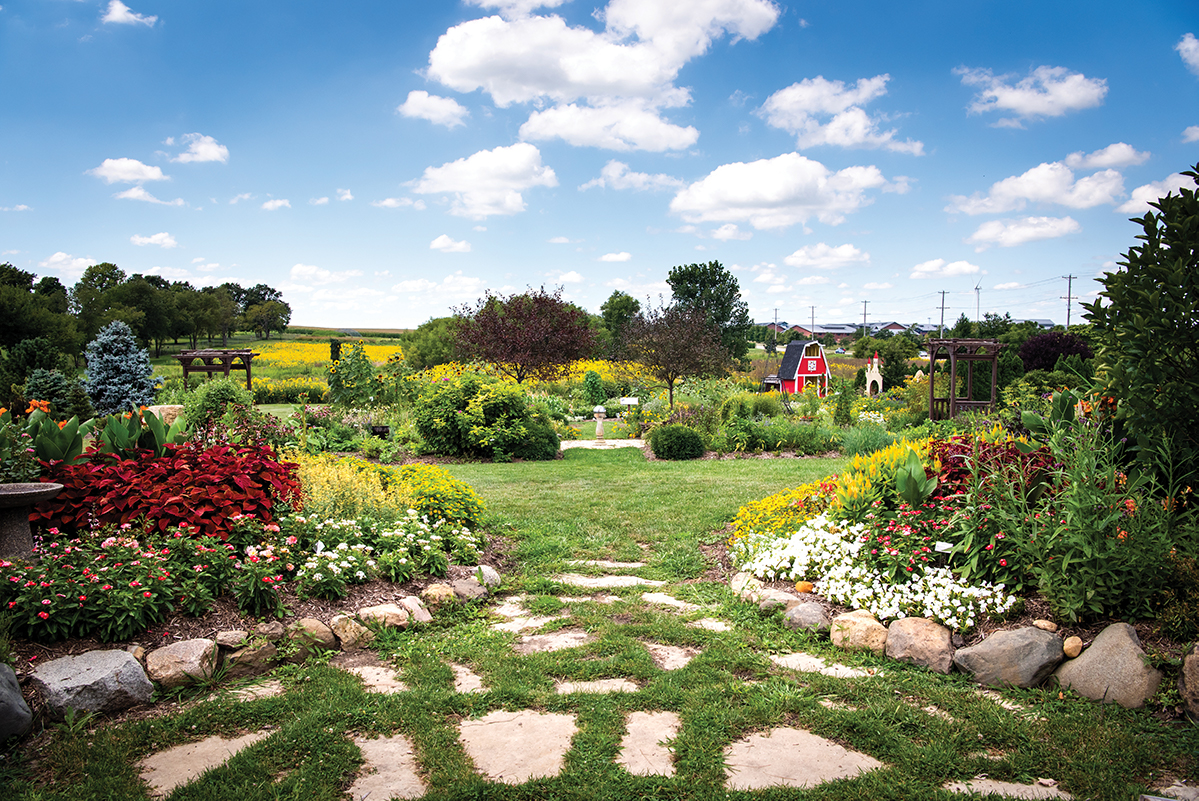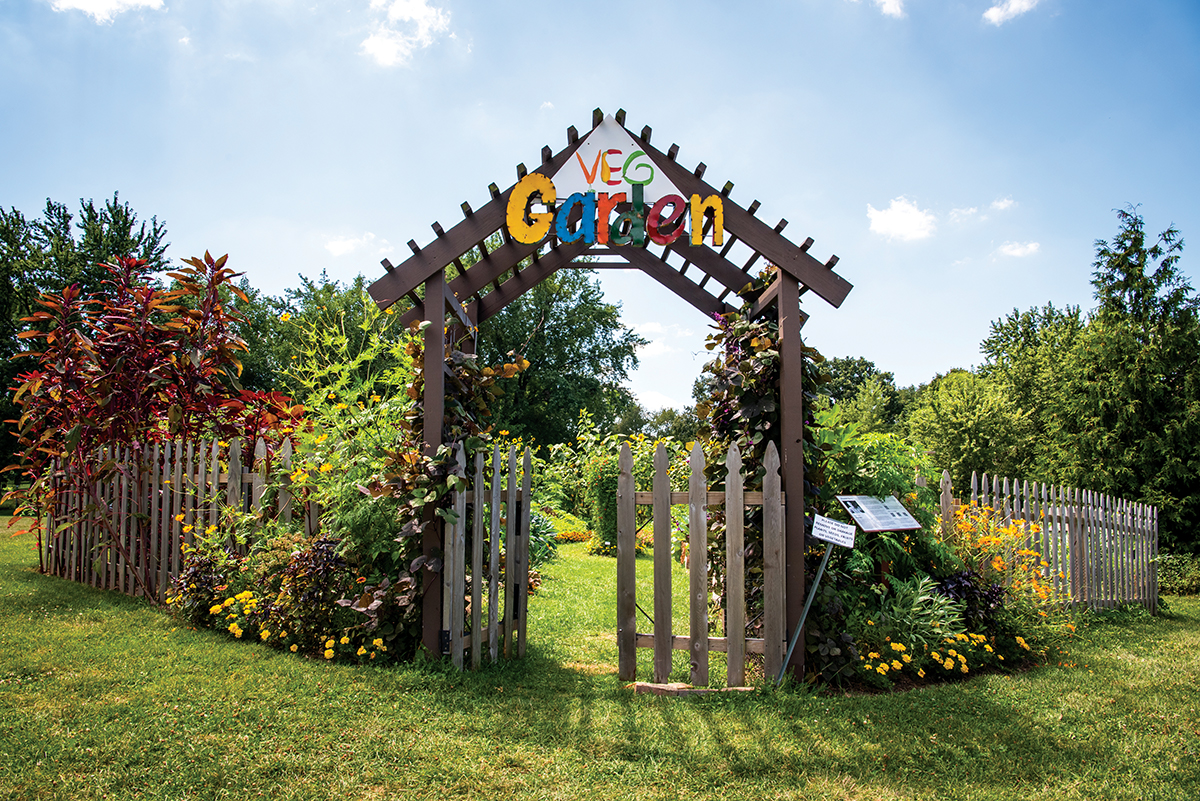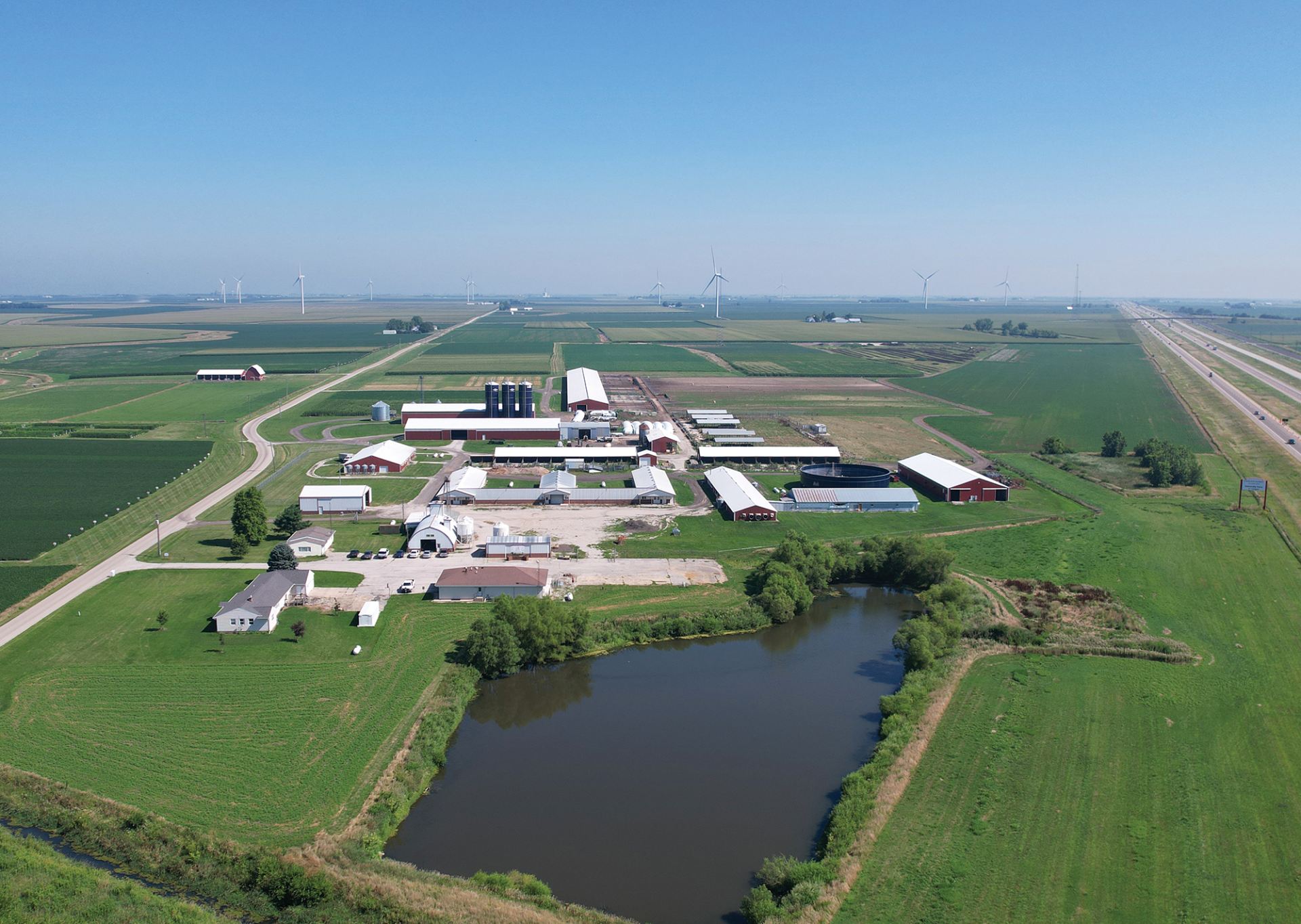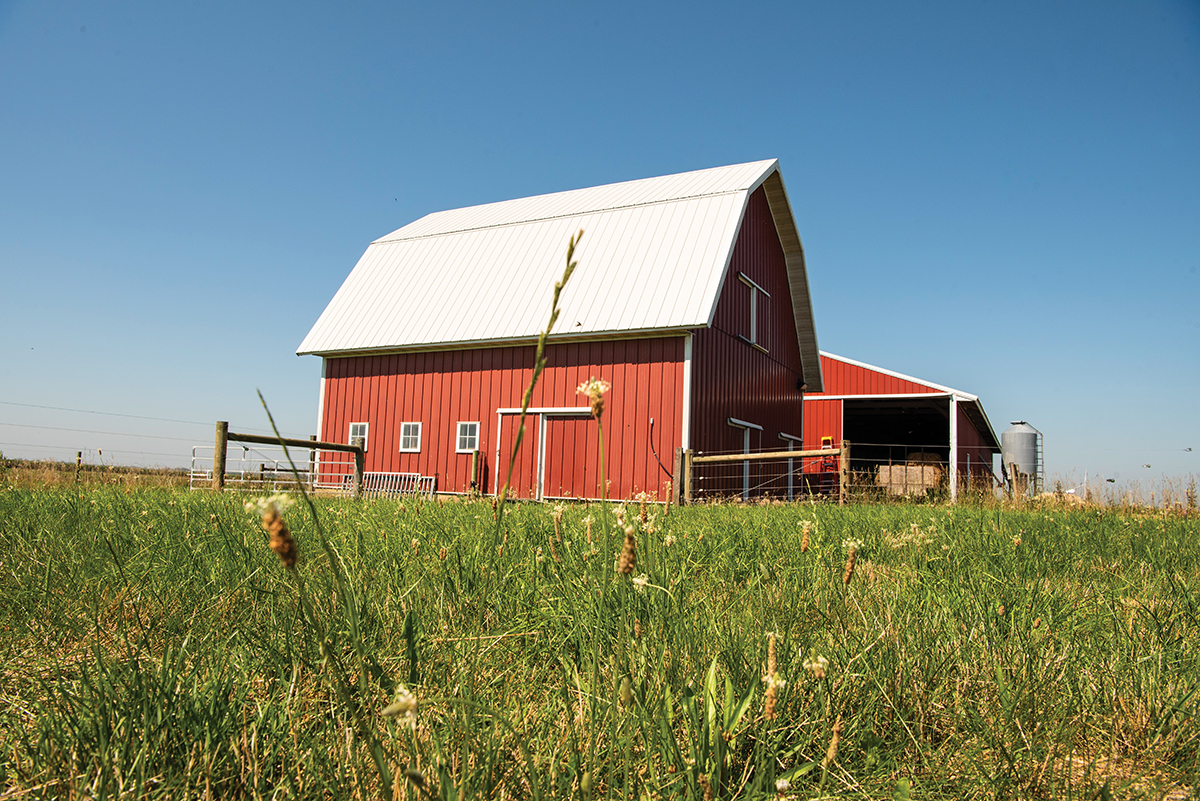From rows of sprouting crops to a blooming native prairie, from a classroom of developing preschoolers to an arena of gravity-defying leaders, growth abounds in the College of Applied Science and Technology’s affiliate programs and centers: the University Farm, the Horticulture Center, the Child Care Center, and the Gamma Phi Circus.
“The operative word in the name of our college is ‘applied.’ That’s who we are,” said Dr. Todd McLoda, dean of the College of Applied Science and Technology (CAST). “These are all applied sciences. We want to move from theory to practice quickly, and each of these affiliates helps us do that.”
Child Care Center
Encouraging children to become lifelong learners is a primary goal of Illinois State Child Care Center Director Carrie Carlson ’98, M.S. ’00, and the center’s three teachers. Located in Turner Hall, the Child Care Center houses one classroom of 20 preschoolers between 3 and 5 years old.
“Our mission is to provide high-quality care and educational services to families and children, and we’re also a working illustration of best practices in early childhood education for college students who want to work with children,” Carlson said.
The Child Care Center opened in 1971, originally as a registered student organization created by a group of married students with preschool children. It has evolved over the past 50 years into a nationally accredited child care program, which also serves as an educational lab for Illinois State students from various disciplines, including family and consumer sciences, education, nursing, psychology, and theatre, among others. Frequent learners in the space include students majoring in human development and family science who complete practicum hours at the center each semester.
Carlson and the Child Care Center’s teachers observe children’s play patterns and listen to their conversations to see what topics interest them. Using the Project Approach, they help children investigate a topic in depth.
“As they investigate the topic, questions they want answered begin to emerge,” Carlson said. “We utilize as many campus and local resources as we can to help them find the answers to those questions on the topic. Through this approach to learning, children use and develop many academic and lifelong learning skills. We’re really helping them learn through many different experiences that include a lot of hands-on opportunities.”
Carlson said there are plenty of unique chances for immersive learning on Illinois State’s campus. The center’s preschoolers have helped fashion design and merchandising students sort donated garments by size and color. They have observed birds in the Fell Arboretum. During a unit on housing, the preschoolers visited a residence hall.
“They wanted to know, ‘Where are the bathrooms? Where do you get your food? If you order pizza for delivery, where do you pick it up? Where do you get your mail?’ You know, the important things in life,” Carlson said. “We often start with a topic, and you never know where it’s going to end up, or it could take a totally different turn than what we expect just by a simple question or interest that a child or a few children might have.”
Carlson first worked in the Child Care Center for two years as an undergraduate family and consumer sciences student followed by a few semesters during graduate school. After leading Heartland Community College’s Child Development Lab, Carlson returned to Illinois State in 2014 for her “dream job.”
“I see it as a huge responsibility,” Carlson said. “We really value and believe in children as being competent and capable, and our college students do too. For me, it’s really being that quality program so our college students can see what early childhood should be like. And we hope that they can take what they learn here out into the community.”
Gamma Phi Circus
The oldest collegiate circus in the United States, Gamma Phi Circus—founded in 1929—is widely known for delivering a high-energy, live-entertainment spectacle showcasing acts such as flying trapeze, juggling, trampoline, and German Wheel, among many others.
“We are also building leaders,” said Gamma Phi Circus Executive Director Marcus Alouan ’01, M.S. ’11, an alumnus of the Gamma Phi Circus and its leader since 2010. Alouan holds a master’s degree in biomechanics from the School of Kinesiology and Recreation and has conducted research on how to reduce or prevent common circus injuries.
Alouan first joined the Gamma Phi Circus troupe after attending a show as an undergraduate and being amazed. “I remember sitting in the stands, and I just couldn’t believe that they would even let me try half of the things that I saw,” said Alouan.
The following fall, Alouan was greeted with smiles when he entered the practice gym for tryouts.
“I was able to try things pretty much right away, and I fell in love with tightwire immediately,” Alouan said. “As soon as I put my foot on the wire, it was like the thing that I had been waiting to do my whole life, and everything just opened up from there.”
While Alouan learned circus skills, he simultaneously grew into a confident leader—an outcome he strives to foster among the Gamma Phi Circus’s cast and crew of more than 100 students from a diverse range of backgrounds and academic disciplines.
“Our students are the hardest working students that you’ll find on any campus, anywhere in the country,” Alouan said.
The Gamma Phi Circus consists of several acts, each with at least one captain in charge of leading its members toward a shared vision. Cast members are required to attend three practices a week in preparation for their annual home shows in CEFCU Arena each April. They also perform several smaller road shows throughout the year, and some serve on the student-run executive board.
Despite the substantial time commitment, Alouan expects the cast and crew to prioritize academics and maintain strong grades.
“I absolutely believe that no matter what career anybody is pursuing, they’re going to be better for being a part of Gamma Phi Circus,” Alouan said. “They’re developing things that affect every corner of your life: persistence, teamwork, being a part of something that’s bigger than yourself. The circus can’t be done without putting in the work over the long haul. The things that you acquire here over time make such an impact.”
His own life shaped by the Gamma Phi Circus, Alouan is grateful for the opportunity to lead the storied program into its 10th decade.
“It is such an honor to be a part of this tradition and this community,” he said. Alouan added that he is proud of current Gamma Phi Circus members and alumni who live by the “CIRCUS” values: commitment, integrity, respect, courage, unity, and service.
“We have amazing students in the circus, and the passion that they put into it is above and beyond,” Alouan said. “To be a part of an organization that is this big, this diverse, this life-changing—it’s incredible.”
Horticulture Center
Although the Horticulture Center is just a mile north of campus, its tranquil gardens and towering native prairie transports visitors far away from the everyday bustle.
“Do you hear that?” Horticulture Center Director Jessica Chambers ’93 asks, pausing a tour to point out dozens of bees buzzing around a cascading green hyssop plant with purple flowers. “Those are happy pollinators.”
Founded in 2005 and stretched across 23 acres north of Illinois State’s Weibring Golf Club, the Horticulture Center is a hub for horticultural instruction and scholarship, as well as public demonstration and outreach. It features a prairie with layers of native 10-foot-tall grasses and flowers that once covered 61 percent of Illinois prior to European settlement. It also includes several gardens and an outdoor classroom.
“The idea was to have a living laboratory,” Chambers said. “Students from all across campus can use the center in a bunch of different ways.”
Chambers and some of her Department of Agriculture colleagues design their curriculum to engage with the Horticulture Center. She also hosts visitors studying a range of disciplines including art, history, and criminal justice sciences—related to environmental law. And the center, which is open to the public, is a frequent destination for community field trips and outings.
“Horticulture is always going to be hands on,” Chambers said. “I think it’s really, really important for people to keep in touch with this aspect of nature.”
The Horticulture Center is a laboratory for faculty members too, with ongoing and planned research related to cover crops, prairie plants, and land art. A graduate of Illinois State’s horticulture program, Chambers takes pride in the space that has been built and maintained by students, faculty, staff, and community volunteers over the past several years. She points out individual gardens—living legacies—that were designed and installed by past horticulture students.
“I tell our students, ‘How you want to use the center is up to you. You can come and visit once. Or you can leave a whole handprint,’” Chambers said.
Students who made an impact at the Horticulture Center are now working in a range of horticulture professions—from directing grounds at a university, to writing for an arboretum, to working for a community park district.
Some alumni occasionally return to the Horticulture Center to check on the gardens they created as students while enjoying the ever-changing, always growing space.
“When you’re out here and you see those pollinators working and you hear the buzz, and you hear the birds; there’s serenity and there’s peacefulness that every individual needs,” Chambers said.
University Farm
Illinois State’s largest laboratory, the University Farm, supports the teaching, research, and outreach activities of the Department of Agriculture. Located near Lexington in northeast McLean County, about 18 miles from campus, the farm utilizes 600 acres for corn, soybeans, alfalfa, cover crops, swine, beef, and sheep.
“We are very lucky to have the farm, for both research and production, to provide our students the opportunity to graduate with hands-on experience,” said Department of Agriculture Chair Dr. Fanson Kidwaro. “Our students are really sought-after, and 99% of them get jobs based on the knowledge they gained at Illinois State, because we provide in-class and hands-on experience in business, in animal science, in crop science, and in horticulture.”
The farm is supported by eight full-time employees along with numerous student workers. Kidwaro said most students won’t work on a farm after graduation, but through their experiences at the University Farm, they’re equipped to land jobs with agriscience companies, agriculture equipment manufacturers, and in the agribusiness sector. Additionally, some animal science students continue onto the veterinary medicine track.
“A lot of students come to us without farm experience,” Kidwaro said. “So the farm gives students the chance to experience how to feed and clean up after swine and cattle and how to handle animal breeding and delivery.”
Kidwaro said the farm’s location is particularly beneficial for researching crop science and fostering partnerships with major agriscience and seed companies, which are prospective employers for students.
“McLean County is No. 1 in the world in terms of soil fertility,” Kidwaro said. “It gives us a great opportunity for these companies to come in and test their varieties and new genetics here. It’s great soil—the best in the world, and production yields are very good. So, they’re able to produce the technology on the crop science side that fuels the agriculture industry in the U.S. to feed the world.”
Illinois State faculty also utilize the farm’s high-quality soil and animal facilities to conduct research while involving undergraduate and graduate students. Kidwaro notes the significance of his department’s work as the global population is expected to increase from 7.9 billion to 9.8 billion in 2050, creating a potential international food shortage.
“The United States is No. 1 when it comes to agriculture,” Kidwaro said. “It is good to be part of the solution to feed the increasing global population. Every small contribution we can make in developing new varieties, developing alternative crops, or developing better management systems—any little contributions we can make in agriculture—it’s enormous to contribute to the ability for us to feed the increasing global population.”
Growing student and community engagement
Although CAST’s four affiliates vary greatly, they each serve an important role in student and community engagement, according to McLoda.
“We really want to share the knowledge and the research that we’re generating here, and these four affiliates in particular give us the opportunity to do that firsthand, working with the community.”
Whether it’s attending a Gamma Phi Circus show, or exploring the Horticulture Center, or buying compost from University Farm, or parents entrusting their children with the Child Care Center—CAST’s affiliates connect the community with the University. They also connect students with their futures.
“I think it is a testament to who we are to have these affiliates associated with the college,” McLoda said. “For our students, it’s getting that firsthand experience with things that they’re going to encounter once they graduate and move into their professional careers.”
